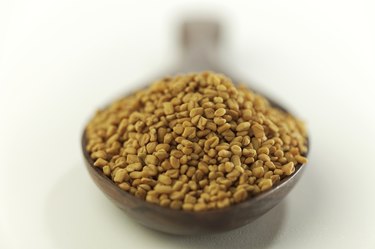
Fenugreek is an herb with a long history of use as a spice and medicine. Many digestive diseases can reportedly be treated with fenugreek, including constipation. Fenugreek rarely causes severe side effects and may be a safe alternative for people seeking natural remedies for constipation. Like any health supplement, consult your doctor before taking fenugreek.
Constipation
Video of the Day
Doctors define constipation as having fewer than three bowel movements in a week. The frequencies of bowel movements commonly vary, and going one day without a bowel movement does not necessarily mean you are constipated, explains the University of Maryland Medical Center. Common causes of constipation include not drinking enough water, not eating enough fiber and not getting enough exercise.
Video of the Day
Fenugreek
The fenugreek plant, also known as Trigonella foenum-graecum, has been used by humans as long ago as 1500 B.C in Egypt. While fenugreek seeds are most commonly used in health supplements, the leaves may occasionally be utilized as well. Traditionally, fenugreek has treated many digestive disorders. Modern researchers are also investigating fenugreek as a treatment for diabetes and high cholesterol.
Fenugreek and Constipation
Fenugreek is sometimes recommended as an alternative treatment for constipation, the New York University Langone Medical Center explains. However, the effect of fenugreek on constipation has not been widely studied in controlled clinical trials. While many people may report beneficial effects on constipation after taking fenugreek, there is very little evidence regarding how common this benefit may be.
Fiber
The reason fenugreek is sometimes recommended as a treatment for constipation is that fenugreek contains high levels of soluble fiber. Foods that contain large amounts of soluble fiber are known as bulk-forming laxatives. When soluble fiber absorbs water in the intestines, it expands, or increases in bulk. This expansion puts pressure on the intestines and triggers contractions that move stools through the intestines and promote bowel movements.
Is this an emergency? If you are experiencing serious medical symptoms, please see the National Library of Medicine’s list of signs you need emergency medical attention or call 911.